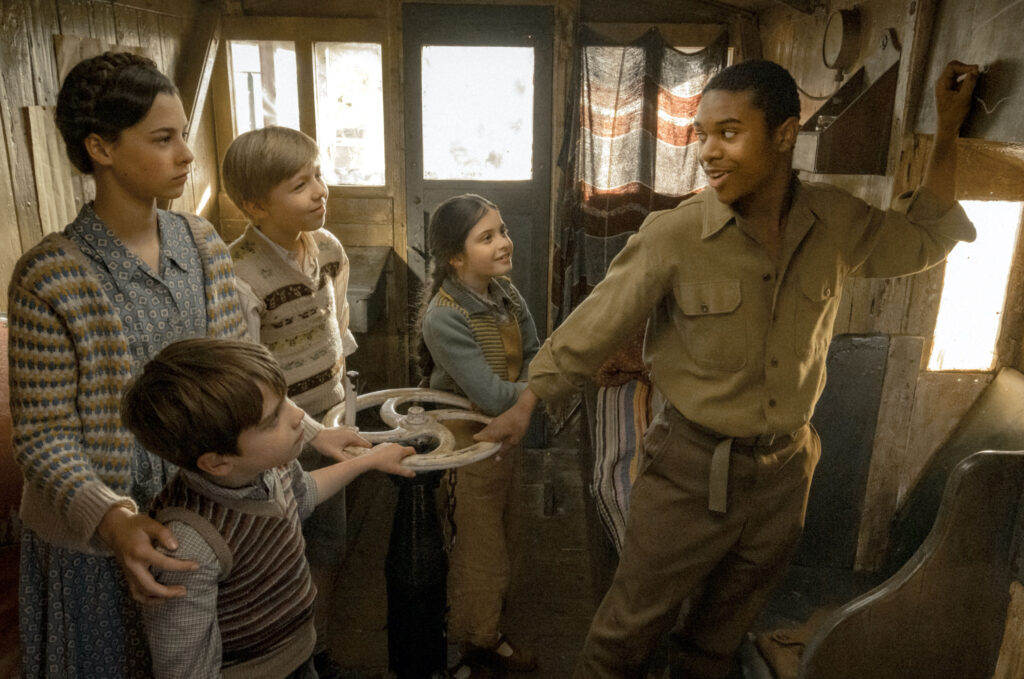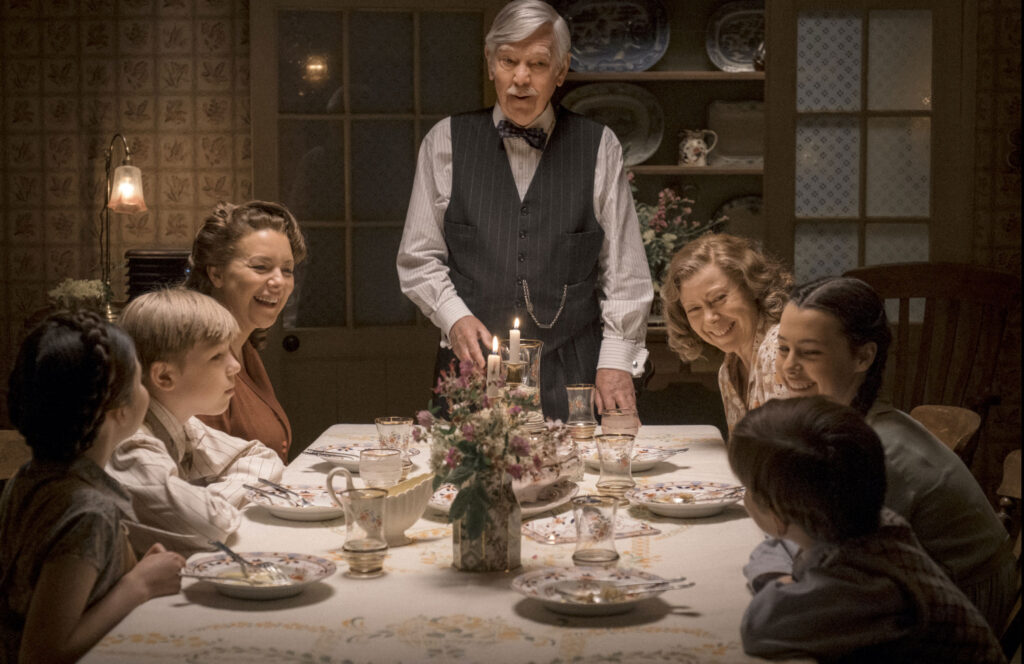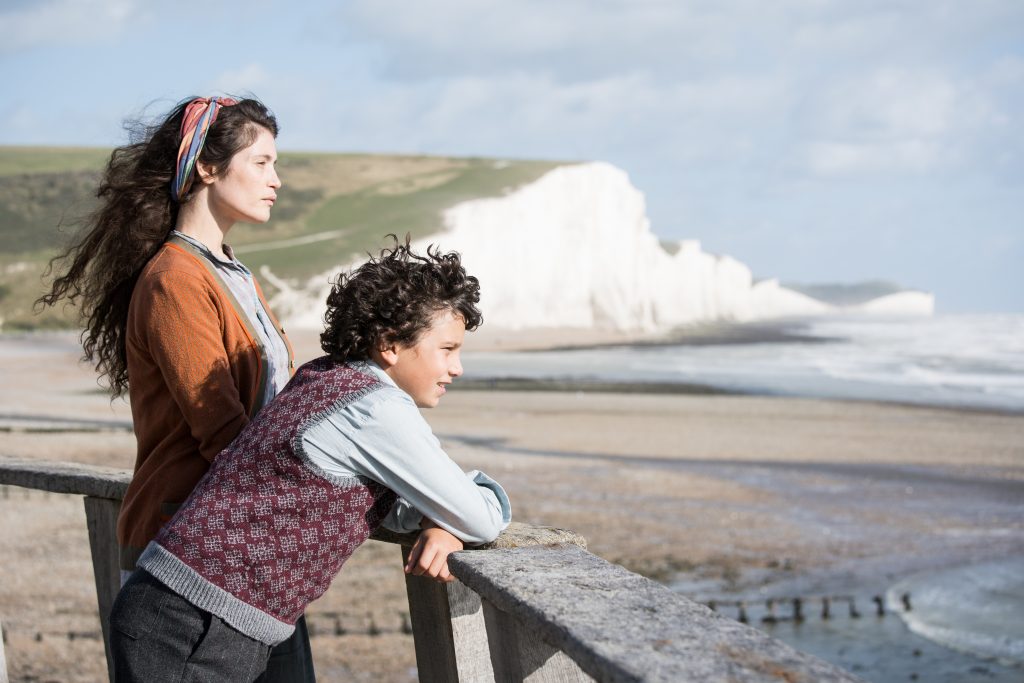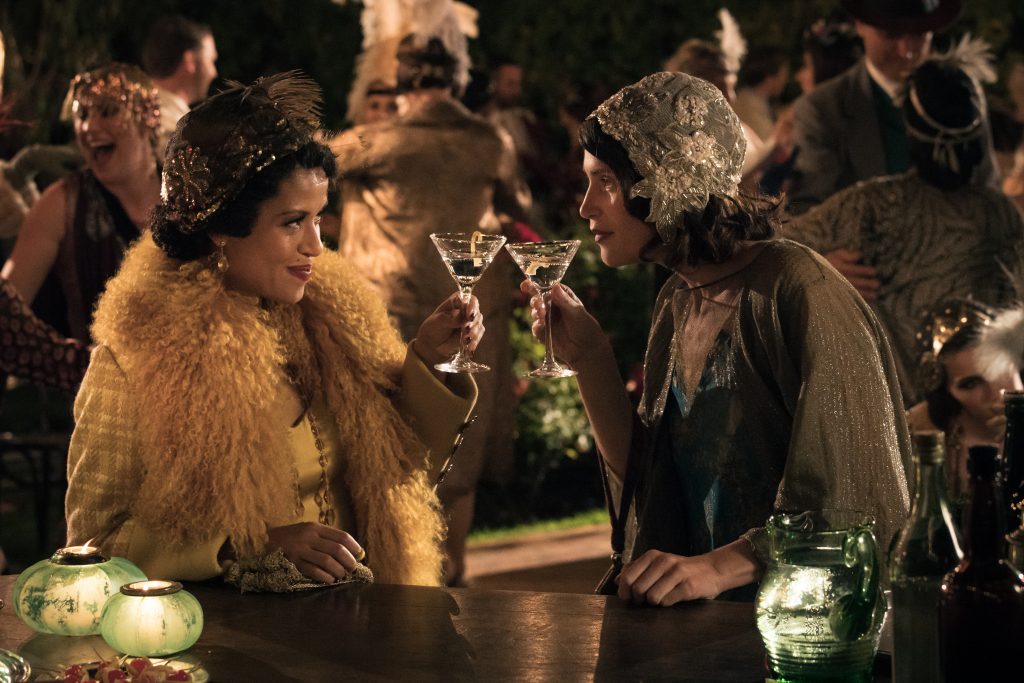November 20, 2022
by Carla Hay

Directed by Morgan Matthews
Culture Representation: Taking place in 1944, mainly in West Yorkshire, England, the dramatic film “Railway Children” features a predominantly white cast of characters (and a few African Americans) representing the working-class and middle-class.
Culture Clash: During World War II, four British children befriend and help a young African American soldier, who has deserted the U.S. Army and has gone into hiding.
Culture Audience: “Railway Children” will appeal primarily to people who are interested in watching corny and sometimes unrealistic dramas that take place during World War II.

Even though the sappy drama “Railway Children” is told from the perspectives of children during World War II, it’s still no excuse for how the movie mishandles issues such as racism and military desertion. The movie’s last 15 minutes are atrociously mushy. Mostly, “Railway Children” is just lackluster and dull, until the last third of the film, where a plot development is crammed in to create a false sense of suspense. This plot development ends up falling very flat because of the way it’s unrealistically resolved.
Directed by Morgan Matthews, “Railway Children” takes place in 1944, mostly in West Yorkshire, England. Daniel Brocklehurst and Jemma Rodgers co-wrote the maudlin “Railway Children” screenplay. If people don’t know anything about the movie before seeing it, the movie’s title might give the impression it’s about vagabond kids who travel by railway. The movie’s actually not about that at all. It’s a sequel to the 1970 film “The Railway Children,” which is based on Edith Nesbit’s 1905 novel. “The Railway Children” was remade into a TV-movie released in 2000.
The children who are the central characters in “Railway Children” (formerly titled “The Railway Children Return”) actually aren’t homeless. Transportation by train is only a significant part of the movie’s plot in the beginning and near the end of the film. “Railway Children” is about three siblings whose mother has made them temporarily relocate from Manchester, England, to West Yorkshire, because a big city like Manchester is more likely to be bombed during the war. Their single mother, who is a nurse, has decided to live and work in Liverpool, England, until it’s safe for her to be reunited with her evacuated kids.
The opening scene of “Railway Children” shows the children’s mother, Angela Watts (played by Jessica Baglow), saying a tearful goodbye to her three kids at the train station in Manchester. She will not be going with them on the train. Eldest child Lily Watts (played by Beau Gadsdon) is about 14 or 15 years old. Middle child Pattie Watts (played by Eden Hamilton) is about 10 or 11 years old. Youngest child Ted Watts (played by Zac Cudby) is about 6 or 7 years old.
Angela tells Lily that because Lily is the eldest child, “You’re the parent now.” Pattie is wearing a dress, and she complains that she doesn’t like wearing dresses. After the children board the train, they meet some other unaccompanied children who have been sent away by their parents for the same reason as the Watts kids. The ticket taker on the train is aware that there are about 20 of these evacuated kids on the train.
During this trip, the kids are mostly obedient but get restless when they are told that the train won’t stop just anywhere for the passengers to use a restroom. The ticket taker gruffly tells Lily that everyone will have to wait until the train gets to the next train station, which has restrooms for people to use. Instead of waiting for that to happen, Lily secretly pulls the train’s emergency brake, forcing the train to stop.
The children then use this interruption to go in a field and relieve themselves. The train conductor suspects Lily pulled the emergency brake and accuses her privately, but she dares him to prove that she pulled the brake. Of course, he can’t prove it.
The main purpose of this scene is to establish early in the movie that Lily is a strong-willed, independent thinker who will break the rules if she thinks it’s for a good reason. Lily demonstrates this personality trait many times throughout the movie, especially when she makes a decision that could get her in trouble with the law. Lily also doesn’t abide by sexist gender roles where girls are expected to be weaker than boys.
When the evacuated kids on the train arrive at West Yorkshire, they are greeted by St. Mark’s School headmistress Annie Clark (played by Sheridan Smith) and Annie’s mother Roberta “Bobbie” Waterbury (played by Jenny Agutter), who live together and are both very welcoming to the kids. Agutter reprises her role as Bobbie, which she played in 1970’s “The Railway Children,” which was about three child siblings in 1905 who try to find out why their father disappeared. In the 2000 TV-movie version of “The Railway Children,” Agutter played the children’s mother.
In the “Railway Children” sequel, various families in the area have gathered at the school to meet the evacuated children and choose which ones they will take into their homes as foster kids. The Watts children don’t want to be separated, but that means no foster family wants to take all three of the Watts siblings together. Bobbie feels a great deal of sympathy for the Watts siblings, because they remind her of herself and her two siblings when she was a child, so she convinces a reluctant Annie to take the Watts siblings into their home.
Annie has an amiable and talkative son named Thomas Clark (played by Austin Haynes), who’s about 10 or 11 years old. Instead of being irritated that he has to share his living space with three kids he doesn’t know, Thomas adapts quickly and seems happy to have the company of kids close to his age. Thomas and the Watts siblings become fast friends and spend most of the movie hanging out together.
Thomas’ father is away, fighting in the war. Lily says that her father is doing the same thing. (As soon as she says that, it’s obvious she’s lying.) An occasional visitor to the household is Annie’s uncle Walter (played by Tom Courtenay), who lives in London and works as a political liaison for the Allies. Walter is a compassionate and wise person, but this character is very underdeveloped in the movie.
Another supporting character who is fairly one-dimensional is Richard (played by John Bradley), the manager of the local train station. Richard acts like a know-it-all and is somewhat impatient with kids. However, Richard likes Thomas enough to show Thomas the surveillance audio equipment that Richard keeps in the train station. Richard tells Thomas that he likes to eavesdrop on unsuspecting people to find out if anyone in town is a traitorous spy.
Unfortunately, the movie’s pace slows down considerably, as it lumbers along in showing how the Watts children have somewhat of a hard time adjusting to their new environment outside of their new household. At school, the Watts siblings are treated like outsiders by the classmates, except for Thomas. Four school bullies, led by a brat named Georgie Duckworth (played by Joseph Richards), try to attack Ted, Pattie and Thomas, but Lily sneaks up behind the bullies and is able to fight them off and scare them away.
“Railway Children” has repetitive scenes of Lily, Ted, Pattie and Thomas playing in an open field area that has some abandoned train cars. They uses these cars as “secret hideouts” when playing games with each other. Lily, Ted and Pattie are happy that they have a new friend in Thomas, but the Watts siblings miss their mother tremendously. Unfortunately, the movie depicts these emotions in a superficial way, as other issues get more importance in the story.
Life in the foster home is fairly tranquil, with occasional disruptions if the four kids are messy or don’t immediately do something that an adult tells them to do. One day, Annie gets a letter from the military with some upsetting news that she wants to keep a secret from the children. The information in the letter is eventually revealed, but the movie drags it out in a weak attempt to have some suspense.
About halfway through “Railway Children,” Lily, Pattie and Thomas make a very surprising discovery in their hideout area. A teenage American soldier named Abraham “Abe” McCarthy (played by Kenneth “KJ” Aikens) is hiding in one of the abandoned train cars. He has a gash injury on one of his legs. Abe tells the kids that he’s 18 years old and that he’s hiding because he’s on a secret mission for the U.S. Army.
Abe asks the children to bring him bandages and begs the kids not to tell anyone that he is there. Of course, all this secrecy means that Abe is probably lying. Eventually, the children find out the truth: Abe has gone absent without leave (AWOL) from the U.S. Army, which has sent the military police and other officials to look for Abe in West Yorkshire. Abe being a military deserter is not the only thing that Abe has lied about, and his other lie is very obvious to figure out.
Several U.S. Army soldiers are temporarily stationed in the area. The movie shows in heavy-handed ways that Abe has additional paranoia about being caught because he’s an African American and is expected to get harsher punishment than if he were white. More than one scene in the movie depicts white American soldiers harassing the African American soldiers, such as when a white American soldier berates and shoves an off-duty African American soldier for talking to a white British woman.
Abe wants to find a way to get on the next train out of town. Lily suggests that Abe get on the train going to Liverpool, where she says Abe can find her nurse mother to give him treatment. This naïve plan is taken very seriously in the movie, which doesn’t even show Lily giving Abe enough information to find her mother in a fairly big city like Liverpool. Meanwhile, Thomas gets very nervous about keeping Abe a secret, so Thomas starts to disagree with Lily about keeping this secret.
“Railway Children” is one of those movies where the kids have a secret plan to help someone and try to outsmart the adults in hatching this plan. Some viewers might find it quaint and charming how it’s all presented in the movie. However, it just comes across as cloying and pandering to people who want a formulaic and lazy movie that doesn’t take any risks and doesn’t try to deal with Abe’s issues in a realistic way.
For example, “Railway Children” makes it look like only the white Americans are racist, when the reality is that white supremacist racism can be anywhere, regardless of the nation. In the movie, Abe says he wants to leave the U.S. Army because of the racism he experiences in the Army. However, “Railway Children” doesn’t adequately address the reality that even if Abe made it back to the United States without getting punished by the U.S. Army, he would still be going back to a nation where racial segragation and other racist practices were legal. Abe talks a little bit about his family, but the British kids helping him don’t seem too interested in knowing what kind of life Abe would be going back home to in America.
All of those societal facts are shoved aside or buried because “Railway Children” wants to be an overly sweet movie about some kind-hearted kids who help a runaway teenager of a different race and nationality. There’s nothing wrong with children being depicted as naïve, but it’s wrong to depict the adults in this story acting like ignorant kids too, especially during a war that was mainly about freeing people from the hatefully bigoted tryanny of Nazi Germany. It doesn’t help that the acting performances in the movie are not very impressive, especially from Aikens, who delivers his lines of dialogue in an awkward and stiff manner.
“Railway Children” missed an opportunity to be a valuable lesson about World War II history and dealing with the harsh realities of war and bigotry. Instead, after a long, boring stretch where not much happens in the first two-thirds of the movie, the last third of “Railway Children” turns into a very clumsily staged runaway caper where everything is dumbed-down in service of being an absurdly sentimental story. Ultimately, “Railway Children” is one in a long list of movie sequels that are far inferior to the movies that spawned the sequels.
Blue Fox Entertainment released “Railway Children” in U.S. cinemas on September 23, 2022. The movie is set for release on digital and VOD on December 6, 2022. “Railway Children” was released in the United Kingdom on July 15, 2022.


